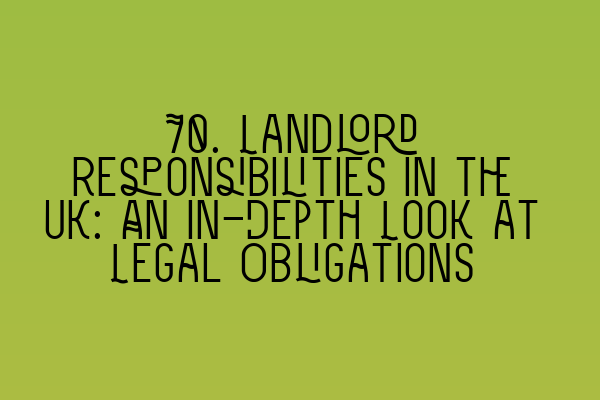Landlord Responsibilities in the UK: An In-Depth Look at Legal Obligations
Welcome to SQE Property Law & Land Law, where we provide expert legal advice and services for property owners, landlords, and tenants. In this blog post, we will delve into the intricacies of landlord responsibilities in the UK. If you are a landlord, it is essential to have a comprehensive understanding of your legal obligations to ensure you remain compliant with the law and provide a safe and habitable environment for your tenants.
1. Providing a Safe and Healthy Environment
One of the primary responsibilities of landlords in the UK is to provide a safe and healthy environment for their tenants. This includes ensuring that the property is free from hazards and meets all necessary health and safety regulations. As a landlord, you must:
- Maintain the structure and exterior of the property in a good state of repair.
- Ensure that all gas and electrical equipment and systems are inspected and certified by qualified professionals.
- Keep common areas and shared amenities, such as staircases, hallways, and gardens, clean and well-maintained.
- Address any potential health hazards promptly, such as mold, asbestos, or pest infestations.
By fulfilling these responsibilities, you not only protect your tenants but also reduce the risk of legal disputes and potential legal action.
2. Providing Adequate Security
As a landlord, it is crucial to provide adequate security measures to protect your tenants and their belongings. This includes:
- Installing secure locks on all external doors and windows.
- Ensuring that any communal entrances are well-lit and have appropriate security measures in place.
- Repairing or replacing broken locks or security devices promptly.
- Informing tenants about any security risks and advising them on how to minimize those risks.
By prioritizing tenant safety and security, you not only fulfill your legal obligations but also foster a sense of trust and confidence between you and your tenants.
3. Repairs and Maintenance
Maintaining the property in good repair is a fundamental duty of a landlord. You are responsible for carrying out necessary repairs and addressing maintenance issues promptly. This includes:
- Fixing any structural defects, such as a leaking roof or cracked walls.
- Repairing plumbing, heating, and electrical systems when they become faulty.
- Addressing any issues with windows, doors, or other essential fittings.
- Maintaining common areas and amenities, including gardens, driveways, and communal facilities.
It is advisable to have a written agreement in place with your tenants, clearly outlining their responsibilities for minor repairs and your obligations for major repairs.
4. Tenancy Agreements and Deposits
When entering into a tenancy agreement with your tenants, it is vital to ensure that it complies with all relevant legislation. This includes providing clear and concise terms and conditions that cover aspects such as:
- Duration of the tenancy
- Rent amount and payment terms
- Rules regarding pets, smoking, and other relevant matters
- Responsibilities of both parties
Additionally, when accepting a deposit from your tenants, you must comply with government-backed deposit protection schemes. These schemes ensure that tenants’ deposits are safeguarded and can be used to resolve any disputes at the end of the tenancy.
5. Compliance with Legal and Regulatory Requirements
Landlords in the UK must comply with various legal and regulatory requirements. Some key areas to consider include:
- Gas Safety: Ensure that all gas appliances and systems are checked by a Gas Safe registered engineer annually.
- Electrical Safety: Have electrical installations and appliances checked by a qualified electrician regularly.
- Energy Performance Certificate (EPC): Obtain an EPC for the property, which provides information about its energy efficiency. The minimum rating required is an E.
- Smoke and Carbon Monoxide Alarms: Install functioning smoke alarms on every floor and carbon monoxide alarms in any room with a solid fuel burning appliance.
By staying up-to-date with these legal and regulatory requirements, you protect yourself from potential legal liabilities and ensure the safety and well-being of your tenants.
Conclusion
Being a responsible and compliant landlord in the UK involves various legal obligations. By providing a safe and healthy environment, ensuring adequate security measures, addressing repairs and maintenance promptly, and complying with legal and regulatory requirements, you create a positive renting experience for your tenants and safeguard your own interests.
At SQE Property Law & Land Law, we understand the complexities of landlord responsibilities in the UK. Our team of legal experts can provide you with tailored advice and guidance to ensure you meet your obligations as a landlord. Contact us today to schedule a consultation or explore our SQE 2 Preparation Courses and SQE 1 Preparation Courses for aspiring property law professionals and those preparing for the SRA SQE exams.
